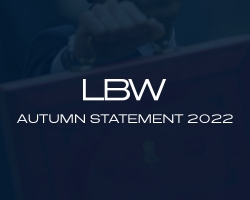At LBW we recognise that all of our clients are unique and require tailored advice. However, in some cases trading through a Limited Company provides a tax efficient vehicle for saving you money.
We provide a complete incorporation service including;
- Company set- up, including full advice surrounding tax efficient directorships/shareholdings
- Informing HMRC of the incorporation and relevant paperwork
- Full advice surrounding VAT including registration, if required
We have identified the tax savings available to you through incorporation and have detailed these below in tabular form (see further advantages of trading as a Limited Company at the bottom of the page):
With the rising rates of personal tax on dividends, when is the right time to incorporate?
Table 1 : TAX & NIC burden self-employed to Limited Company 2017/2018
| Profit | Sole Trader | Company | Saving |
| £10,000 | £313 | £61 | £252 |
| £15,000 | £1,463 | £1,309 | £154 |
| £20,000 | £2,913 | £2,354 | £559 |
| £30,000 | £5,813 | £4,861 | £952 |
| £40,000 | £8,713 | £7,369 | £1,344 |
| £50,000 | £12,263 | £10,769 | £1,494 |
| £75,000 | £22,763 | £22,100 | £663 |
(Certain assumptions have been made regarding withdrawal of funds - each situation will need to be considered on its own merits).
Table 2 : Corporation tax table (Historic and future rates)
|
Profits |
Year starting 6th April |
|||||||
|
2011 |
2012 |
2013 |
2014 |
2015 |
2016 | 2017, 2018 & 2019 | 2020 | |
|
Up to £300K |
20% |
20% |
20% |
20% |
20% |
20% | 19% | 17% |
|
£300,001 - £1.5M |
27.5% |
25% |
23.75% |
21.25% |
20% |
20% | 19% | 17% |
|
Over £1.5M |
26% |
24% |
23% |
21% |
20% |
20% | 19% | 17% |
Further advantages of trading as a Limited Company
Legal personality
An incorporated business is a legal entity in its own right. This means that it can enter into contracts, employ staff, lease property and have its own obligations and liabilities.
Limitation of risk
Incorporation limits the personal liability of the individuals involved. Incorporation is an important consideration if the organisation intends to employ any staff or undertake major contractual obligations.
Clear ownership structure/governance
Unincorporated organisations can operate relatively informally, being governed only by their constitutions. However, this means the powers and processes for decision making can be unclear. Incorporation involves the formalisation of governance structures within a legislative framework.
Developing a sense of ownership
Incorporation provides an established formal structure for some types of stakeholder involvement.
Public accountability
With limited liability comes regulation and disclosure requirements, which can increase public confidence in the company. Limited companies have to have a registered address, file their constitutions, annual accounts and prescribed details of their directors etc.
Recognition by financial institutions and investors
Many banks and financial institutions will insist on incorporation before providing loan finance.
Availability of equity finance
Equity finance is only available to certain types of incorporated organisations. If you want to raise equity investment, your organisation will have to incorporate.






